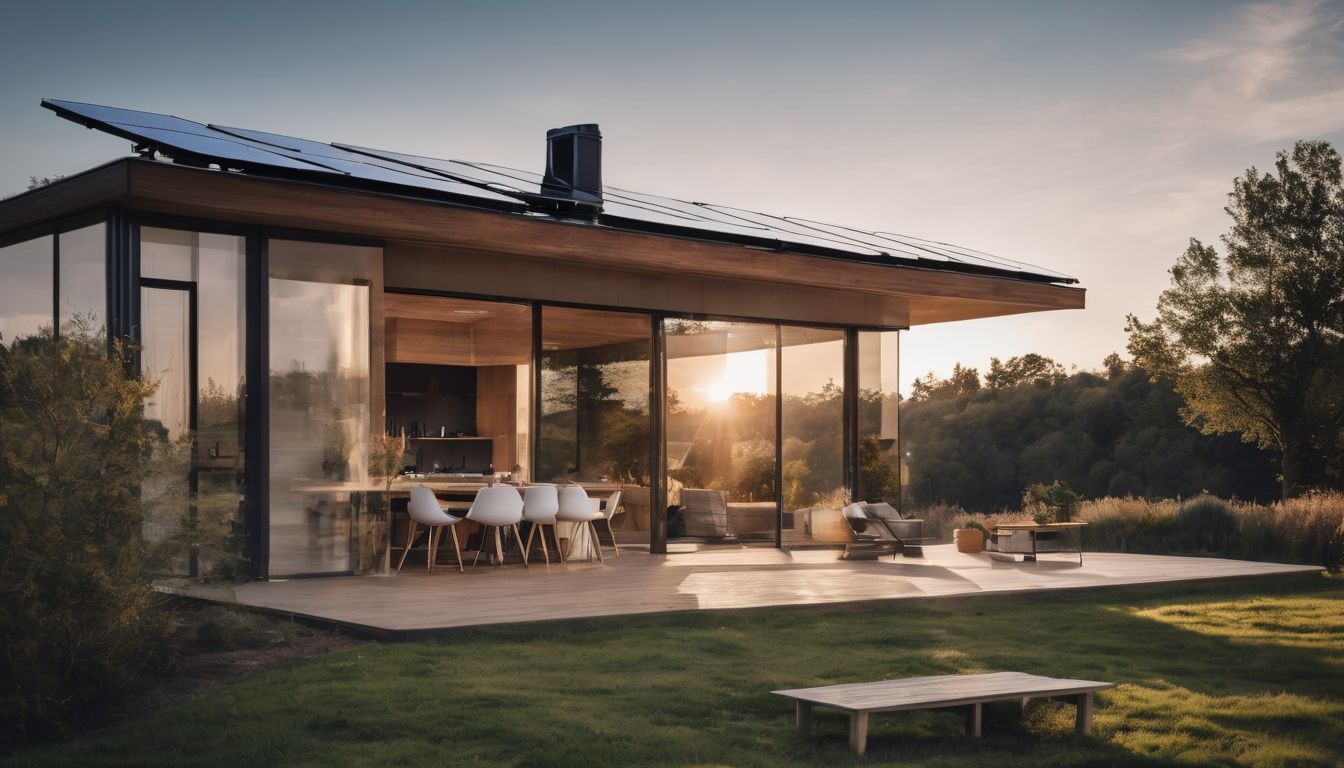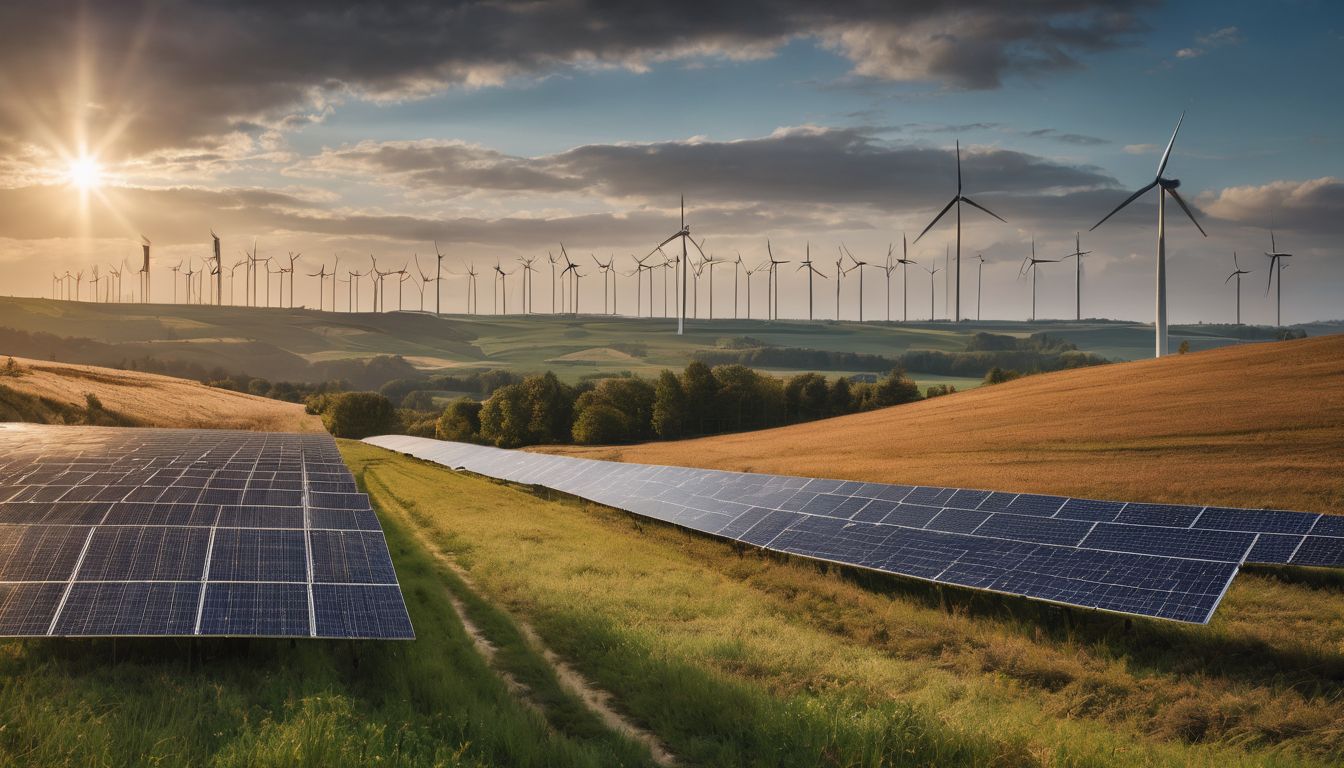Feeling tired and sluggish can be a sign that it’s time for change. Did you know that an average UK household could save around £270 per year just by being more energy-efficient? Our guide offers easy-to-follow steps to shift towards a low-energy lifestyle, boosting both your well-being and the planet’s health.
Keep reading to spark your energy revolution!
Key Takeaways
- Embracing a low – energy lifestyle can result in up to 30% reduction in household energy consumption, potentially saving UK households around £460 annually.
- Adopting energy – efficient habits and technologies could lead to a 45% decrease in global energy demand by 2040 and a significant drop in greenhouse gas emissions.
- While transitioning may bring emotional challenges, practical strategies like setting realistic goals, staying active, getting quality sleep, managing stress, and considering talking therapy can aid the adjustment process.
- Engaging with supportive communities provides motivation and advice during the transition to sustainable living practices.
- Small steps such as using LED lights which save up to 50% of energy compared to traditional bulbs or investing in eco-friendly appliances significantly contribute toward mitigating climate change.
The Importance of Transitioning to a Low-Energy Lifestyle
Understanding the environmental imperative and embracing energy efficiency is crucial for sustainable living. Statistics show that transitioning to a low-energy lifestyle not only benefits the environment but also reduces energy costs and promotes a healthier way of living.
Understanding the environmental imperative
Our planet faces urgent environmental challenges that demand immediate action. Transitioning to a low-energy lifestyle reduces greenhouse gas emissions, curbs climate change, and conserves finite resources.
Every step toward energy efficiency plays a significant role in safeguarding our ecosystems for future generations.
Embracing eco-friendly practices means adopting renewable energy sources and energysaving habits. It’s about making conscious choices—like using energyefficient appliances and supporting sustainable living initiatives—that collectively make a huge difference.
Individuals who choose greener ways of living help lead the fight against environmental degradation while forging paths towards a more sustainable future.
Statistics on the benefits of energy efficiency
Shifting towards a low-energy lifestyle isn’t just a personal win; it can have profound effects on our environment. Compelling statistics underscore the importance of energy efficiency.
| Statistic | Benefit |
|---|---|
| Up to 30% reduction in energy consumption | Household energy efficiency improvements can lead to significant savings on utility bills. |
| 45% potential decrease in energy demand by 2040 | Global adoption of energy-efficient practices and technologies could dramatically lower energy demand. |
| 25% reduction in greenhouse gas emissions | Enhanced energy efficiency in homes, industries, and transport can contribute to a quarter cut in emissions. |
| 2.3 million jobs created in 2010-2015 | Investments in energy efficiency measures have led to job creation in manufacturing, installation, and maintenance sectors. |
| Up to 50% energy saved by LED lights | Switching to LED lighting from traditional bulbs results in significant energy conservation. |
| £460 annual savings for UK households | Energy-efficient appliances and home insulation can save British families hundreds of pounds each year. |
Implementing changes in our energy habits can be emotionally taxing. Let’s explore the emotional journey of transitioning to a low-energy lifestyle.
The Emotional Journey of Transitioning
Transitioning to a low-energy lifestyle can bring about emotional struggles and challenges, but it also opens the door to a new connection with the environment. Overcoming these roadblocks is essential for embracing a sustainable future.
Unveiling the emotional struggles of change
Embracing a low-energy lifestyle can be emotionally challenging, as it involves breaking free from familiar habits and routines. Adjusting to new ways of conserving energy and reducing carbon footprint may lead to feelings of uncertainty and discomfort.
It’s natural to experience resistance or frustration when altering daily practices, such as transportation choices or energy consumption patterns.
Overcoming these emotional hurdles requires patience and self-compassion. By recognising the potential for personal growth in embracing change, individuals can tap into resilience and adaptability.
Embracing a new connection with the environment
Making a conscious effort to connect with the environment enhances our understanding of the impact we have on the world around us. Engaging in eco-friendly practices, such as reducing energy consumption and minimising waste, fosters a sense of responsibility towards environmental sustainability.
Taking small steps like conserving water, recycling, and supporting sustainable energy sources can significantly contribute to mitigating climate change.
Adopting an eco-friendly lifestyle not only benefits the environment but also promotes personal health and well-being. Regular physical activity outdoors helps boost energy levels and reduces stress while building a deeper appreciation for nature.
Overcoming challenges and roadblocks
Embracing a low-energy lifestyle can be challenging, but with determination and the right strategies, it is possible to overcome these challenges. Here are practical ways to navigate the emotional rollercoaster:
- Set realistic goals for energy conservation.
- Seek support from like – minded individuals or groups for motivation and guidance.
- Practice mindfulness to stay focused and positive during the transition.
- Embrace flexibility and adaptability when faced with unexpected obstacles.
- Educate yourself about the benefits of low – energy living to reinforce your commitment.
- Implement small changes gradually rather than attempting a complete overhaul all at once.
Strategies for Navigating the Emotional Rollercoaster
Coping with the mid-afternoon energy slump is crucial for maintaining productivity and focus throughout the day. Getting support during the transition can make a world of difference in managing emotional struggles and staying committed to a low-energy lifestyle.
Coping with the mid-afternoon energy slump
Dealing with the mid-afternoon energy slump can be challenging, but there are effective strategies to help you overcome it and regain your vitality. Here’s how to cope with the mid-afternoon energy slump:
- Take a brisk walk outside to get some fresh air and sunlight, which can help boost your energy levels.
- Have a healthy snack that includes a good balance of protein, fibre, and healthy fats to provide sustained energy without causing a crash later on.
- Stay hydrated by drinking plenty of water throughout the day to combat dehydration, which can lead to fatigue.
- Practise deep breathing exercises or meditation for a few minutes to increase oxygen flow and clear your mind.
- Engage in light stretching or yoga to invigorate your body and relieve muscle tension that contributes to tiredness.
- Listen to upbeat music or engage in a brief social interaction to lift your spirits and increase alertness.
- Refrain from consuming high-sugar or highly-caffeinated drinks which can result in an energy crash later on.
- Reviewing and adjusting your work environment for better ergonomics can help prevent physical fatigue that contributes to low energy levels.
Getting support during the transition
Navigating the transition to a low-energy lifestyle can be challenging, but it’s important to remember that you don’t have to go at it alone. Seek the support of friends, family, or even online communities who share your environmental values and goals.
Surrounding yourself with like-minded individuals can provide encouragement, advice, and motivation as you embrace sustainable living. Engaging in open conversations about your journey can help alleviate feelings of isolation and empower you to stay committed to your eco-friendly practices.
Remember that there is strength in community and seeking support during this transition will make a positive impact on both your emotional well-being and your commitment to a low-energy lifestyle.
Practical Tips for Boosting Energy Levels and Fighting Fatigue
– Regular and healthy eating, staying physically active, getting quality sleep, managing stress levels, and considering talking therapy are all practical tips for boosting energy levels and fighting fatigue.
These strategies can help individuals transition to a low-energy lifestyle while maintaining their overall health and wellness.
Eat regularly and healthily
Maintaining a balanced diet is essential for sustaining energy levels and supporting overall health. Here are some practical tips for incorporating healthy eating into your low-energy lifestyle:
- Prioritise whole foods such as fruits, vegetables, whole grains, lean proteins, and healthy fats to provide essential nutrients and promote sustained energy.
- Include regular meals and snacks throughout the day to maintain steady blood sugar levels and avoid energy crashes.
- Plan your meals ahead of time to ensure you have nourishing options readily available, reducing the temptation to reach for unhealthy convenience foods.
- Stay hydrated by drinking plenty of water and limiting sugary beverages that can lead to energy fluctuations.
- Consider mindful eating practices to savour and appreciate your meals, fostering a positive relationship with food and promoting digestive wellness.
Stay physically active
To complement a healthy diet, maintaining an active lifestyle is crucial for low-energy living and environmental stewardship. Here are practical ways to stay physically active whilst minimising energy consumption:
- Engage in outdoor activities like hiking, cycling, or gardening to reduce reliance on energy-consuming equipment.
- Embrace low-impact exercises such as yoga, Pilates, or tai chi, which promote personal well-being without contributing to excessive energy use.
- Incorporate daily walks or bike rides into your routine for sustainable transportation and physical activity.
- Opt for activities that require minimal equipment or electricity, like bodyweight workouts and resistance training using eco-friendly materials.
- Pursue community-based fitness initiatives such as group walks, park clean-ups, or nature conservation projects to combine exercise with environmental advocacy.
Get quality sleep
After staying physically active, it’s essential to prioritise quality sleep for maintaining a low-energy lifestyle. Here are some practical tips for achieving and maintaining high-quality sleep:
- Establish a consistent sleep schedule by going to bed and waking up at the same time every day, even on weekends.
- Create a relaxing bedtime routine such as reading, taking a warm bath, or practising deep breathing exercises to signal your body that it’s time to wind down.
- Ensure your sleeping environment is conducive to rest by making your bedroom dark, quiet, and cool.
- Limit screen time before bed, as the blue light emitted from electronic devices can interfere with your natural sleep-wake cycle.
- Invest in a comfortable mattress and pillows that support good spinal alignment and promote restful sleep.
- Avoid consuming caffeine and heavy meals close to bedtime as they can disrupt your ability to fall asleep.
Manage stress levels
Consider talking therapy
Talking therapy can provide valuable support during the emotional journey of transitioning to a low-energy lifestyle. This form of therapy offers a safe space to process the challenges and roadblocks that may arise, helping individuals navigate their emotional rollercoaster with greater ease.
Through open conversations with a trained therapist, individuals can gain insights into their emotions, develop coping strategies for the mid-afternoon energy slump, and find effective ways to manage stress levels.
By integrating talking therapy into their transition process, environmentally conscious individuals can access additional support in embracing eco-friendly practices while prioritising their mental well-being.
Incorporating talking therapy as part of the transition towards a low-energy lifestyle empowers individuals to embrace change positively and build resilience in pursuing an eco-friendly way of living.
Therapy sessions provide an opportunity to explore new connections with the environment and understand the emotions related to this transformation, creating a solid foundation for maintaining an energy-efficient and sustainable lifestyle.
Conclusion: Moving Towards a Sustainable Future
Transitioning to a low-energy lifestyle is essential for environmental sustainability. By embracing eco-friendly practices, we can reduce our carbon footprint and contribute to a healthier planet.
It’s time to take action and pave the way for a sustainable future. Making small changes in our daily lives can lead to significant positive impacts on the environment. Let’s commit to living an energy-efficient, eco-friendly lifestyle for the well-being of our planet.
FAQs
1. What does transitioning to a low-energy lifestyle mean?
Transitioning to a low-energy lifestyle involves adopting eco-friendly practices that reduce energy consumption, such as living actively instead of leading a sedentary life.
2. Why should I consider an energy-efficient lifestyle?
Choosing an energy-efficient lifestyle helps you lower your carbon footprint and supports eco-friendly living for the well-being of the planet.
3. Can I transition to a low-carbon lifestyle without going zero-waste?
You can start by making small changes towards an eco-friendly lifestyle before fully committing to a zero-waste approach; every effort counts.
4. Will changing my habits really make a difference in adopting an ecofriendly lifestyle?
Absolutely! Each step you take towards using less energy contributes to building sustainable and responsible environmental behaviour.





